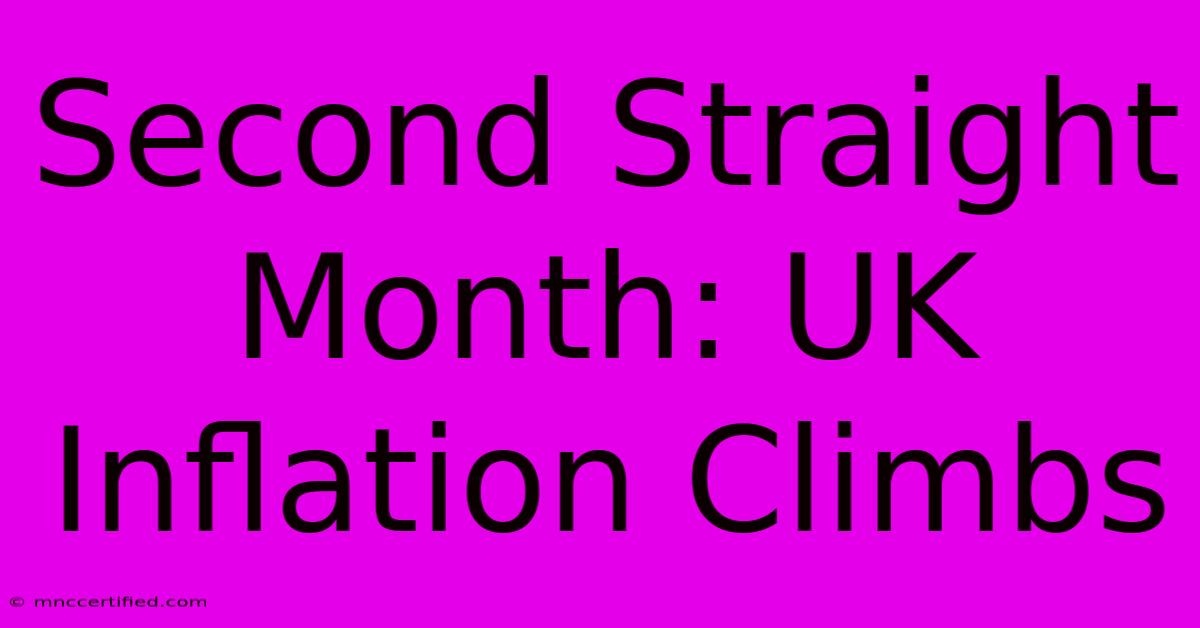Second Straight Month: UK Inflation Climbs

Table of Contents
Second Straight Month: UK Inflation Climbs – A Worrying Trend?
The UK has seen inflation rise for a second consecutive month, sparking concerns about the cost of living crisis and the potential for further economic instability. This persistent upward trend presents a significant challenge for the Bank of England and the government, requiring careful analysis and strategic intervention. This article delves into the factors contributing to this troubling increase, its impact on households, and potential future scenarios.
Understanding the Inflationary Pressure
The latest figures reveal a concerning climb in the Consumer Price Index (CPI), marking the second consecutive monthly increase. This sustained rise signifies a hardening of inflationary pressures, moving beyond the temporary blips initially anticipated. Several key factors are fueling this persistent inflation:
Energy Prices Remain Elevated
Energy prices continue to play a dominant role in driving inflation. Although slightly eased from recent peaks, the lingering effects of the global energy crisis, exacerbated by geopolitical instability, keep energy costs significantly higher than pre-pandemic levels. This directly impacts household budgets and contributes to broader inflationary pressures. Understanding the intricacies of global energy markets is crucial to predicting future inflationary trends.
Supply Chain Disruptions Persist
Supply chain bottlenecks, although easing in some sectors, still cause delays and increased costs for businesses. This translates to higher prices for consumers as businesses struggle to absorb these added expenses. The fragility of global supply chains remains a significant risk factor for inflation.
Wage Growth and Demand
While wage growth is occurring, it's largely failing to keep pace with inflation. This means that despite pay increases, many households are experiencing a real-terms decline in disposable income. This further fuels demand-pull inflation, as consumers try to maintain their living standards amidst rising prices. The delicate balance between wage growth and inflation control is a key challenge facing policymakers.
Impact on Households and the Economy
The sustained rise in inflation is having a significant and multifaceted impact:
- Increased Cost of Living: Households are facing a substantial squeeze on their disposable income, leading to reduced spending and a potential decline in consumer confidence.
- Reduced Purchasing Power: The erosion of purchasing power means that consumers can afford less with their existing income, impacting demand across various sectors.
- Pressure on Businesses: Businesses are grappling with rising input costs, leading to difficult decisions regarding pricing and potential job cuts.
- Potential for Social Unrest: Persistent high inflation can contribute to social and political instability as citizens struggle with the increased cost of living.
What Lies Ahead? Potential Scenarios and Policy Responses
Predicting the future trajectory of inflation is inherently challenging. However, several potential scenarios exist, each with its own implications for policymakers:
- Scenario 1: Continued Inflation: If inflationary pressures persist, the Bank of England may need to implement further interest rate hikes to cool the economy. This could lead to slower economic growth and potentially a recession.
- Scenario 2: Controlled Inflation: With targeted policy interventions and a gradual easing of global supply chain issues, inflation may begin to moderate, allowing for a softer landing for the economy.
- Scenario 3: Stagflation: A prolonged period of high inflation coupled with slow economic growth represents a significant risk. This scenario would necessitate a more complex and nuanced policy response.
The Bank of England's response will be crucial. Further interest rate increases are a likely possibility, but the delicate balance between controlling inflation and avoiding a recession requires careful consideration. Government policy also plays a vital role, particularly in addressing energy costs and supporting vulnerable households.
Conclusion: Navigating Uncertain Times
The continued rise in UK inflation presents a significant economic challenge. Understanding the underlying factors, the impact on households and businesses, and the potential future scenarios is crucial for informed decision-making. The coming months will be critical in determining whether the UK can navigate these uncertain times effectively and mitigate the damaging effects of sustained inflation. Regular monitoring of economic indicators and policy responses will be essential to track the evolving situation and prepare for potential future developments.

Thank you for visiting our website wich cover about Second Straight Month: UK Inflation Climbs. We hope the information provided has been useful to you. Feel free to contact us if you have any questions or need further assistance. See you next time and dont miss to bookmark.
Featured Posts
-
Post Lineker Bbc A Womens World
Dec 19, 2024
-
Snowfall Forecast Map Precise Timing
Dec 19, 2024
-
Kent Shoe Zone Closures 4 Shops
Dec 19, 2024
-
Ca Duo Misses 760 M Lottery
Dec 19, 2024
-
Southampton 1 2 Liverpool Game Summary
Dec 19, 2024